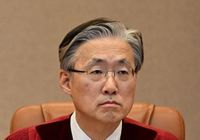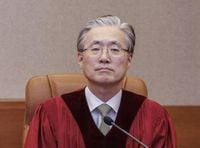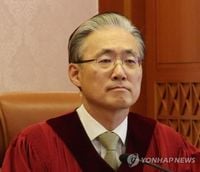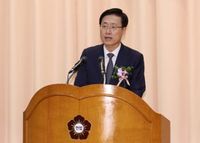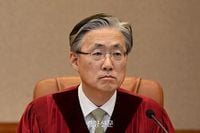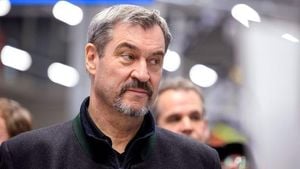On April 21, 2025, Kim Hyung-doo was appointed as the new Chief Justice of the Constitutional Court, succeeding Kwon Han-dae-haeng. This appointment comes after a judges' meeting held that morning, where the court's justices convened to select a successor to the acting Chief Justice. The announcement was made public shortly after the meeting concluded, marking a significant transition in the leadership of South Korea's highest court.
Kim Hyung-doo, who is 60 years old and a graduate of Seoul National University’s College of Law, began his legal career in 1993 as a judge at the Uijeongbu branch of the Seoul District Court. His extensive experience in the judiciary includes roles as a presiding judge at the Seoul High Court and the head of the 2nd Civil Affairs Division at the Seoul Central District Court. He has also contributed to legal policy and administration, serving as a member of the Judicial Policy Research Council and a senior research member at the Judicial Policy Research Institute.
According to the Constitutional Court Act, specifically Article 12-2, if the Chief Justice is unable to perform their duties due to a vacancy or other reasons for more than a month, a judge is selected from among their peers to act in that capacity. Kim's selection as the acting Chief Justice is significant, as he is the most senior judge among the current seven members, having begun his term on April 6, 2023, after being appointed by former Chief Justice Kim Myeong-soo.
The recent changes in the court's leadership come in the wake of the retirement of Moon Hyung-bae, who served as the acting Chief Justice until April 18, 2025, when he completed his term alongside Justice Lee Mi-sun. Following their departures, the Constitutional Court has returned to a seven-member system, a structure that is expected to remain until new justices are appointed.
Legal experts and commentators have noted that Kim Hyung-doo is regarded as a moderate figure within the judiciary, known for his balanced approach to legal interpretation. His involvement in judicial reforms during the tenure of former Chief Justice Lee Yong-hoon has further solidified his reputation as a key player in the evolution of South Korea's legal landscape. Kim's experience also extends internationally, having served as a visiting researcher at Tokyo University in Japan and Columbia University in the United States.
As the acting Chief Justice, Kim will lead the court during a critical period. The Constitutional Court is currently operating under a seven-judge system, which allows for case reviews and judgments to proceed, albeit with some limitations. For instance, decisions on impeachment trials and constitutional complaints require the support of at least six judges, which may lead to delays in certain cases until additional justices are appointed.
Kim's appointment comes at a time when the Constitutional Court is facing significant challenges, including high-profile cases and public scrutiny regarding its decisions. The court's ability to navigate these issues effectively will be closely watched, especially with the upcoming presidential election in June 2025, which could lead to further changes in its composition.
In recent months, Kim has been actively involved in various judicial proceedings, including the impeachment trial of former President Yoon Seok-yeol, where he notably asked the most questions of witnesses among the judges. This engagement has demonstrated his commitment to thorough judicial processes and has garnered attention for his active role in court proceedings.
Looking ahead, the next Chief Justice is expected to be selected following the presidential election, as the new president will have the authority to nominate candidates for the position. Until then, Kim Hyung-doo will serve as the acting Chief Justice, guiding the court through its current challenges and maintaining the integrity of the judiciary.
The recent developments within the Constitutional Court underscore the importance of judicial leadership in shaping legal precedents and upholding the rule of law in South Korea. As Kim Hyung-doo assumes his new responsibilities, the legal community and the public alike will be observing how his tenure unfolds and what it means for the future of the court.
